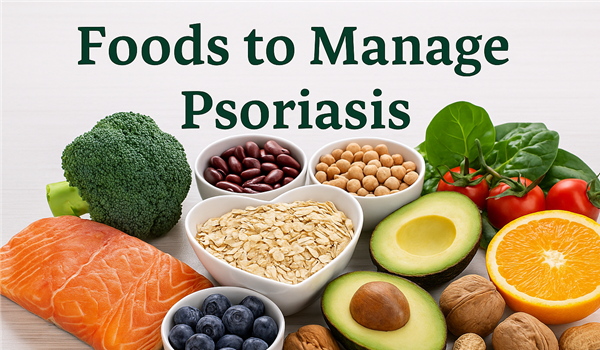Psoriasis diet nutrition skin support

Patient Information Leaflet: Foods to Support Skin Health and Manage Psoriasis
Kensington Medical Centre – Belfast
⸻
What Is Psoriasis?
Psoriasis is a long-term skin condition that causes red, scaly, and sometimes itchy patches. It is linked to inflammation and an overactive immune system. While there’s no specific “psoriasis diet,” certain foods may help manage flare-ups, reduce inflammation, and support skin health.
⸻
How Can Diet Help?
• Reduce overall inflammation in the body
• Support the immune system
• Maintain a healthy weight (which can reduce symptom severity)
• Minimise triggers and improve skin health
⸻
Skin-Supporting Foods to Include
1. Anti-Inflammatory Omega-3 Fats
Help calm the immune system and reduce skin inflammation.
Examples:
• Oily fish (salmon, mackerel, anchovies, sardines, herring)
• Flaxseeds, chia seeds
• Walnuts
2. Colourful Fruits and Vegetables
Rich in antioxidants and vitamins that help repair skin and reduce flare-ups.
Examples:
• Berries, oranges, apples, grapes
• Leafy greens, carrots, sweet potatoes, broccoli
3. Wholegrains
Provide fibre to support gut health and reduce inflammation.
Examples:
• Oats, brown rice, wholemeal bread, quinoa
4. Probiotic Foods
Support a healthy gut, which is linked to better immune control.
Examples:
• Live yoghurt, kefir
• Sauerkraut, kimchi
• Miso
5. Vitamin D-Rich Foods
Low vitamin D levels may be linked to psoriasis severity.
Examples:
• Eggs
• Oily fish like salmon, mackerel, anchovies, sardines, herring
• Fortified dairy and plant-based milks
6. Zinc and Selenium-Rich Foods
Support skin repair and immune balance.
Examples:
• Nuts and seeds (pumpkin seeds, sunflower seeds, Brazil nuts)
• Seafood (especially shellfish)
• Wholegrains
⸻
Foods to Limit or Avoid
Some people with psoriasis report flare-ups linked to:
• Red or processed meats
• Dairy products (especially full-fat versions)
• Refined sugar and sugary snacks/drinks
• Excess alcohol
• Highly processed foods (ready meals, fast food, etc.)
Tip: Keep a food and symptom diary to spot possible triggers. Not all people with psoriasis will be sensitive to the same foods.
⸻
Lifestyle Tips for Psoriasis
• Maintain a healthy weight – excess weight can worsen symptoms
• Exercise regularly – helps reduce inflammation and boost mood
• Limit alcohol – it may trigger flare-ups in some individuals
• Manage stress – relaxation techniques can reduce flare frequency
• Stay hydrated – drink 6–8 glasses of water a day
⸻
When to See a Doctor
Speak to your GP if you:
• Want guidance on diet and psoriasis triggers
• Have new or worsening skin symptoms
• Are considering supplements (like omega-3 or vitamin D)
• Need support with weight loss or healthy eating
You may be referred to a dermatologist or dietitian for further care.
⸻
For more information, visit www.nhs.uk/conditions/psoriasis
This leaflet is for general information only. Please speak to your healthcare provider for advice specific to you.
Medical Disclaimer
The dietary advice and information provided in this leaflet are for general guidance and educational purposes only. They are not intended to replace personalised advice, diagnosis, or treatment from a qualified healthcare professional.
If you have a medical condition, are taking medication, are pregnant or breastfeeding, or have specific dietary needs or food allergies, you should consult your GP, dietitian, or another healthcare provider before making significant changes to your diet.
Following general dietary recommendations without proper medical supervision may not be suitable for everyone and could result in unintended health effects. Always seek individualised medical advice for your personal health circumstances.
Page created: 03 June 2025